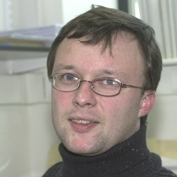
|
|
|
Conférenciers invitésPr. Arthur EDISON (Université de Georgie, USA) Art Edison completed his Ph.D. in biophysics from the University of Wisconsin-Madison, where he developed and applied NMR methods for protein structural studies under the supervision of John Markley and Frank Weinhold. In 1993, Dr. Edison joined the laboratory of Antony O. W. Stretton at the University of Wisconsin as a Jane Coffin Childs postdoctoral fellow, where he investigated the role of neuropeptides in the nervous system of the parasitic nematode Ascaris suum. He joined the faculty at the University of Florida in 1996. He has had a productive research program discovering elements of chemical communication in nematodes for the past decade. Dr. Edison was the founding PI and Director of the NIH-funded Southeast Center for Integrated Metabolomics, and his research focuses on the role of small molecules in biology and disease. He was also a UFRF professor from 2012-2014. After 19 years at the University of Florida, Dr. Edison recently moved to the University of Georgia as a Georgia Research Alliance Eminent Scholar and Professor of Genetics and Biochemistry & Molecular Biology. He is also a member of the UGA Institute of Bioinformatics. Prior to his career in academic science, Art was a saddle maker in Santa Fe, New Mexico, and he continues with custom leatherwork and a blog as a weekend complement to his academic pursuits.
Pr. Elizabeth HILL (Université du Sussex, GB) Liz Hill gained a PhD in pesticide biochemistry and then undertook postdoctoral studies at the University of Wales, Bangor on the identification of biologically active lipid metabolites in marine organisms. She then joined the group of Dr Robert Murphy, Denver, Colorado, and developed mass spectrometry methods to study the role of eicosanoid metabolites in inflammation and disease. In 1995 she joined the University of Sussex where she is now a Professor of Environmental Toxicology. Her group has used bioassay-directed methods to identify endocrine disrupting chemicals in human and wildlife tissues. In recent years she has pioneered the use of nanoflow-nanospray mass spectrometry methods to study mixtures of contaminants comprising the exposome and their effects on disruption of signalling pathways in wildlife and humans. Examples include projects which have enhanced our understanding of the effect of effluent exposure on fish health and studies of how long term exposure to antiretroviral drugs causes toxicity in HIV-infected patients.
Dr. Kris Moreel (Université de Gent, Belgique) Kris Morreel has obtained his PhD in the bio-energy group of Wout Boerjan at the university of Ghent, Belgium. His PhD focused on LC-MS profiling of poplar phenolics. This metabolism was further explored via QTL analyses of metabolite concentrations and comparative profiling of transgenic plants. Afterwards, he joined the group of Joachim Kopka at the Max Planck Institute for molecular plant physiology in Potsdam, Germany, during a short term EMBO in which he studied the primary metabolism of lignin-modified plants via GC-MS. This was followed by a 5-years appointment as metabolomics expert at the VIB department of Plant Systems Biology in Ghent Belgium. Since 2012, he is again working in Boerjan’s lab as a staff scientist. During the last 5 years, his interest has focused on structural characterization via negative ionization HRMS and the exploration of plant phenolic metabolism.
Dr. Patrick KIEFER (ETH Zurich, Suisse) Patrick Kiefer did his PhD in metabolic engineering at Saarland University in Germany under supervision of Elmar Heinzle and Christoph Wittmann. During his thesis he investigated the metabolism of amino acids producing bacteria applying mass spectrometry (MS) based methods for metabolic flux analysis (MFA). In 2005, he moved to France where he joined the group of Jean-Charles Portais at INSA Toulouse to develop new LC-MS method with stable isotope labeling for MFA. Since 2006 he is responsible for the LC-MS platform in Julia Vorholt's group at ETH Zurich, Switzerland. His work mainly focus on the development of new LC-MS based workflows for label and label free metabolomics approaches with major emphasis on new LC-MS data analysis tools. If he is not in the lab, he is on his bike somewhere in the mountains. |


